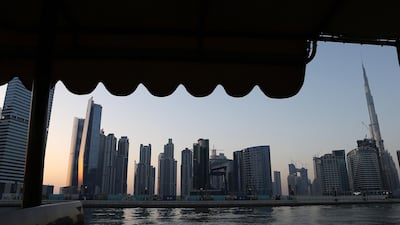The geopolitical tensions in the Middle East and beyond are the biggest risk for global sovereign investors, outflanking inflation as their primary concern for continued economic momentum, a study has found.
Eighty-three per cent of global sovereign wealth funds, including 95 per cent of those from the broader Middle East region, consider conflict as the prime factor that could derail global growth over the next 12 months, Asset manager Invesco said in its annual Global Sovereign Asset Management Study, released on Monday.
The overwhelming concern also reflects worries about competition between the major global powers that has the potential for trade disruption, Invesco said.
To mitigate geopolitical risks, investors are now inclined to explore investment opportunities in the fast-growing emerging market assets, said the report, which surveyed 140 investment officials at 83 sovereign wealth funds and 57 central banks, managing a combined $22 trillion in assets.
“Amid an unpredictable macro environment, sovereign investors are recalibrating their portfolios,” said Josette Rizk, head of Middle East and Africa at Invesco.
“Emerging markets are gaining traction, with funds adopting a selective approach.”
Although trailing geopolitics, inflation still remains a significant concern.
Up to 43 per cent of sovereign funds and central banks globally, as well as 68 per cent of those surveyed in the Middle East, expect inflation to settle above central bank targets.
Almost three-quarters of investors – including 70 per cent in the Middle East – anticipate interest rates and bond yields to remain in the mid-single digits over the long term, indicating a shift in their expectations.
The state-controlled sovereign funds, especially those in the oil-rich economic bloc of the GCC, invest on behalf of their respective governments and are vital for the region's economic diversification efforts.
These sovereign funds, along with their global peers, are reshaping their portfolios to reflect the new macro environment, with 27 per cent globally and half of those surveyed in the Middle East planning to increase allocations to infrastructure over the next year.
Only 6 per cent of SWFs – none in the Middle East – expect to cut allocations, the Invesco report found.
Emerging markets are garnering more attention as 54 per cent of SWFs surveyed, including 71 per cent in the Middle East, expect them to benefit by playing off competing global powers.
About 54 per cent (86 per cent in the Middle East) said emerging markets were becoming more attractive “due to near-shoring and regionalisation”.
Of the emerging market regions, Asia – excluding China – is leading the way, as 83 per cent of SWFs surveyed, including 100 per cent of those in the Middle East, look at the region as a priority.
“India remains in the spotlight, with 88 per cent of SWFs worldwide and 100 per cent in the Middle East viewing it as an attractive market for increasing EM debt,” the report said.
In terms of asset classes, private credit is gaining popularity among sovereign funds.
“Only 35 per cent of global sovereign funds and 22 per cent in the Middle East currently have no investments in private credit,” the report said.
“More than two-thirds (69 per cent) of SWFs, including 71 per cent of those in the Middle East, plan to increase allocations to private credit, reallocating from fixed income, equities, and private equity.”
The US is the most attractive market for private credit, followed by Western Europe. There is also growing interest in emerging market private debt.
“Private credit is increasingly attractive to SWFs, with many investing through funds and direct deals,” Ms Rizk said.
“SWFs in the region favour developed markets but are also exploring emerging markets while balancing defensive and opportunistic strategies to navigate the competitive landscape.”


